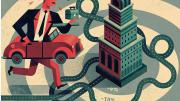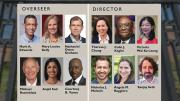As america’s workplaces regroup after the pandemic, a team of researchers suggests that companies take a closer look at one of the potential drudgeries of office life: the commute.
In a study conducted before the pandemic, Andy Wu, assistant professor of business administration, found that the farther employees must travel to get to work, the more their productivity and innovation suffer. The idea for this study emerged while Wu was in graduate school; he and a fellow student had inadvertently stayed in their office after hours, brainstorming research ideas. When they noticed the time, “We started complaining about the need to commute home,” Wu recalls, which led them to consider how a commute affects employee performance.
It certainly has an impact on employees’ physical and mental health. “The prior literature shows very clearly that commuting causes depression, heart disease, mental stress, and increased rates of obesity,” Wu says. But he and colleagues Hongyu Xiao, now an economist at the Bank of Canada, and Jaeho Kim, a former research associate at Harvard and current graduate student at the University of Pennsylvania’s Wharton School, wanted to measure precisely how travel to and from work influences an employee’s productivity and ability to innovate. They chose to study inventors, whom they saw as a good stand-in for a range of skilled, creative workers. And thanks to the U.S. Patent and Trademark Office, Wu explains, “There are very good records of what inventors produce and the impact of what they produce.”
The researchers studied 3,445 inventors working at 1,180 firms from 1997 to 2012, a period that they chose intentionally because it largely predates broad telecommuting and remote work. The inventors lived and worked in five U.S. metropolitan regions, including the Boston-Worcester-Providence area and San Jose-San Francisco-Oakland area; home-buyer data revealed how far employees traveled to get to the office. Wu and his colleagues focused on firms that moved to new offices during that period, enabling them to compare the productivity of employees in the same firm who had their trip to the office shortened with those who faced a longer commute.
The study revealed that for every 10 miles of added travel distance, the firms that employed those inventors registered 8 percent fewer patents. Even more dramatic, the patents’ quality—measured by the number of times a patent was cited by other inventors—dropped 11 percent with every 10 miles added to an inventors’ commute.
Firms’ best-performing inventors suffered the greatest productivity losses when their commute grew longer.
One of the most surprising findings, Wu says, is that firms’ best-performing inventors suffered the greatest productivity losses when their commute grew longer. This raises important questions about where company leaders should establish offices to foster innovation and growth. “Companies often determine their office location based on where their CEO wants to live,” he says. “But this might be the wrong way to do it. Instead, where do your best inventors want to live?”
Wu theorizes that short commutes support innovation by giving employees more time to spend in the office, and more opportunities for in-person collaboration, while removing the stress and physical strain of a long commute. Because many U.S. workers had commute-free arrangements during the pandemic and liked them, some are tempted to see Wu’s findings as support for work-from-home scenarios, but he stresses that’s not the case: “Commuting is bad, but that doesn’t automatically mean that remote work is good. Having people in the office for water-cooler conversation is very important for innovation, and we don’t have a virtual substitute for that yet.”
Some companies are already adopting strategies to cope with the commuting conundrum, particularly in regions where housing is expensive and limited. Google is building a company town for employees near its offices in Mountain View, California, and Facebook has offered employees cash incentives to move nearer to work. Skillz, an e-sports and video-gaming company cofounded by Casey Chafkin M.B.A. ’11, was preparing to sign a lease on a large office building in San Francisco before COVID. “But through the pandemic it occurred to them that this would be inefficient, especially in the remote-work era,” Wu says. “They decided instead to acquire several smaller offices scattered around the city and the Bay Area so every employee would have an office close to them. That way they can come into the office, but also have a minimal commute.”
The study has limitations; it did not examine how different methods of commuting might influence productivity. Could a relatively peaceful train commute induce fewer negative effects compared to driving in bumper-to-bumper traffic? And although Wu thinks that these findings would apply to highly educated workers in other fields that require technical skills or creativity, such as software development, he believes they wouldn’t necessarily hold true for other types of occupations, such as administrative staff or factory workers. He also wonders how the work-from-home options adopted during the pandemic might change the negative impact of being far from the office, and notes that this could make for interesting future research.
The study on commuting has received plenty of attention, in part because “it seems that everyone has very strong feelings about their commute,” Wu says. “Those that are in C-suite positions or HR positions need to take commuting into account when making decisions for the firm. The commute is not just the workers’ problem. As a manager, it’s your problem too.”








